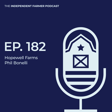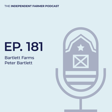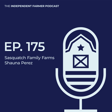Become a Creator today!Start creating today - Share your story with the world!
Start for free
00:00:00
00:00:01

Exclusive Content: Five Key Tips from CSA Farms Making Six Figures
With a variety of best practices and techniques for how to create a successful Farm business, it can get overwhelming to know which tactics actually work. Many CSAs have developed proven tactics to increase revenue, lock in early buyer commitments, and streamline processes to ensure products go out the door with money in hand.
In this week's episode, listen to the audible version of our eBook - Five Key Tips from CSA Farms Making Six Figures
Find more Farm business resources, including eBooks: https://www.barn2door.com/resources
Transcript
Introduction and Podcast Overview
00:00:10
Speaker
Hello and welcome to the Independent Farmer Podcast, the go-to podcast for do-it-yourself farmers who are taking control of their own business, skipping the middleman, and selling direct to local consumer and wholesale buyers. This podcast is hosted by Barn to Door, the number one business tool for independent farmers to manage their business, promote their brand, and sell online and in person. Let's dive in to today's Independent Farmer Podcast.
Key Tips for CSA Farms' Success
00:00:43
Speaker
Five key tips from CSA Farms making six figures. Introduction. There are many factors that can determine the success of your CSA. When you start the season, inventory configuration, how you access customers, and your order management process. Many farmers have developed proven tactics to increase revenue, lock in early buyer commitments, and streamline processes to ensure products go out the door with money in hand.
00:01:10
Speaker
At Barn to Door, we serve thousands of farms across America and have found what works to create a six-figure business model. In this ebook, we share how the top-performing CSAs have created a blueprint for how to build a successful business. CSA farmers should use this as a guide to gain insights and apply best practices to create their own six-figure CSA.
The Importance of Online Presence for CSA
00:01:32
Speaker
Key tip number one, online creates access to more customers. Today, Americans expect to order from farms anytime, anywhere. Most businesses are online, allowing customers to purchase the products they need, when they want, and how they want. To grow your CSA business in today's market, it is an expectation that your farm can be found through a single online search.
00:01:55
Speaker
Farmers should be available on all channels, such as web, mobile, social, and email, to spread awareness to all customers. One-third of customers search for local businesses online every day, whether that be perusing the web, social media, such as Facebook and Instagram, and checking their emails to shop for local businesses. If your farm isn't online, you're missing out on an entire pool of loyal local customers that want to purchase from your farm.
00:02:24
Speaker
By giving customers the ability to order what they want, when they want, you're creating a convenient purchasing experience that buyers expect. However, the ability to buy from your farm online isn't only beneficial to your customers, it's beneficial to your business.
00:02:39
Speaker
Farmers save time with streamlined operations and reduce the number of customer interactions to close a sale. With the power of a farm web store, it's easy to manage orders, track fulfillments, and understand buyers' habits. Cutting down the time to make quicker and more informed business decisions that impact your inventory and route to market.
00:03:01
Speaker
Steps to success.
Strategies to Engage and Build Trust with Customers
00:03:03
Speaker
Sell through an online store. In 2021, peak online shopping hours occurred between 8 p.m. and 10 p.m. local time. To meet your customers' expectations, your farm needs to sell through an online store. As 96% of Americans have made at least one online purchase, buyers expect a point-and-click purchasing experience from your farm.
00:03:25
Speaker
Prior to barn to door, farmers average seven plus customer interactions before an order is complete. Reducing the amount of manual work and time it takes to secure a single sale is key to creating a thriving CSA business. When all of your information is in one place, customers can easily place an order when it's top of mind and without taking time out of their day. Farmers see many online orders placed during all hours of the night. Think of all the customers you'll be able to serve with the extended store hours.
00:03:57
Speaker
Engage customers on all channels. When you want to generate curiosity and interest in your products, the key is to engage customers on all channels, such as web, mobile, social, and email.
00:04:10
Speaker
Taking the time to develop an experience that embodies your farm brand, including your mission, practices, products, and core values, becomes easy to boost brand recognition in your local community. Web and mobile. A beautiful, customized website to entice buyers to learn about your farm and mobile responsiveness is key to building trust.
00:04:31
Speaker
Introduce your farm, values, practices, and products. Customers want to learn more about your farm, but it needs to be at their own pace. A website allows them to learn what your farm embodies and easily find where to purchase your products. As 96% of Americans have made at least one online purchase, buyers expect a point-and-click purchasing experience from your farm. Social
00:04:56
Speaker
Today, 72% of Americans use some kind of social media to actively search for new brands and local businesses. Building your presence on social channels, such as Facebook and Instagram, allow customers to build a relationship with you. By using a mix of the three E's, entertain, educate, and e-commerce, to create and share a balanced mix of content about your farm, buyers discover a lot about your brand, becoming loyal followers and, ideally, repeat customers. Email.
00:05:26
Speaker
Email is one of the most powerful tools a farm can use to drive sales. With the strong email strategy, farmers can boost sales by up to 30% with regular email communications. Buyers visit their inbox every day, meaning when farms send biweekly or weekly updates, they generate regular purchases.
00:05:44
Speaker
When CSAs build a successful strategy to engage customers online, they build brand recognition and increase sales. With streamlined processes to accept orders, track buyer trends, and reduce the time it takes for you to coordinate fulfillments, you'll get hours back to your day and create a steady stream of income. A case study from Honeybee Hills Farm in North Carolina.
Streamlining Operations and Customer Satisfaction
00:06:07
Speaker
As only 1% of Americans regularly attend farmers markets, Liz Mason of Honeybee Hills understood the need to pivot her business online. She realized that while in-person markets were the traditional avenue to reach customers directly, she was missing out on about 99% of buyers who would like to support local farms. By pivoting Honeybee Hills online with Barn to Door, Liz attracted new buyers, ditched the spreadsheets, and now enjoys streamlined operations to manage her large CSA and multiple delivery schedules.
00:06:38
Speaker
By implementing a consistent and strong email strategy, Honeybee Hills generates up to 80% of its weekly orders through a single newsletter. Sending regular emails helps Liz keep customers up to date on what's happening on the farm, generate add-on purchases from loyal buyers, and re-engage customers that haven't purchased in a while.
00:06:58
Speaker
Liz Mason says, there's a direct correlation between sending out our weekly newsletter and people placing their orders for delivery or pickup. I would say about 80% of our sales occur within six hours of sending the Monday newsletter. Key tip number two, simplified inventory is the key to success. The most successful CSAs have learned that the key to success is to simplify their inventory, creating an easy, simplified purchase experience for customers.
00:07:28
Speaker
When Americans are faced with too many options, they quickly become overwhelmed with choice paralysis. This often results in abandoned purchases and incomplete orders.
00:07:38
Speaker
Buyers actually convert, also known as completing their purchase, at a higher rate with fewer choices. Why? Because more options mean more time to make a decision. This often leads customers to return to what's familiar and easy, returning to brands or grocery experiences they are familiar with and don't have to think about. When CSA farms reduce the number of options provided to customers, buyers can make quicker decisions which increase conversion rates.
00:08:06
Speaker
Your inventory layout is a key factor when buyers purchase from your farm. According to Amazon, studies show that products on the first page drive 80% of all purchases, while the first three listings on page one get at least 60% of those orders. That's why it's essential that the products you want to draw the most attention to should be pinned to the top of your farm store inventory.
00:08:27
Speaker
Six-figure CSAs have realized that keeping product packaging and inventory limited drives more sales. To fully understand how their buyers purchase, CSAs have implemented the best practices to drive purchases. Steps to success. Cater to household sizes.
00:08:46
Speaker
One third of Americans live alone, one third of Americans live with two people, and one third of Americans live in groups of four or more people, which means it's essential to package products that meet the needs of multiple groups. Offering a single 10-pound CSA box would be too much for those who live alone.
00:09:03
Speaker
When farmers cater to different household sizes, they increase their buyer reach by serving multiple needs and demographics. The most successful CSAs offer three CSA box sizes, small, which is four to six varieties, medium, which is six to eight varieties, and large, which is 10 or more varieties. Incorporate your brand and your packaging.
00:09:26
Speaker
Your brand is key to your farm's identity. Incorporating your brand in your packaging makes it easier for customers to remember your farm and adds a personalized touch.
00:09:37
Speaker
Add a simple farm-branded sticker, customize note about how you appreciate their business, or incorporate custom packaging if you have the means. These special moments remind buyers why they purchase from local businesses. Encourage buyers to post on social media and tag your farm. User-generated content is a great way to engage your followers online. Offer bundle boxes.
00:10:00
Speaker
When farms offer bundle boxes, buyers are delighted with the convenience of accessing multiple products in a single unit of sale. Bundles can simply be a produce box or salad bundle, spring vegetables box, or summer harvest box. You can also include value-added products like honey, sauces, salsas, and spice mixes. By offering bundles, you can offer a one-stop shop experience, making it easy for customers to access a range of items through a single purchase.
00:10:29
Speaker
A case study from Little River Farm in Rhode Island. Camille of Little River Farm in Rhode Island has always run a CSA, focusing on microgreens and produce. Originally, she was only offering two ounce and six ounce bags of microgreens, noticing that customers would gravitate towards one or the other.
00:10:48
Speaker
She experimented offering a one-pound bag at a discounted rate to see how customers reacted. Customers loved it. Expanding her packaging options while still keeping it simple with three different sizes to choose from helped her cater to a wider audience and create a convenient experience for individuals and families alike. Key tip number three.
00:11:08
Speaker
Farmer's Choice Subscriptions are your secret weapon. Six-figure CSAs have pivoted from using the word CSA to subscriptions, to advertise the process of providing regular access to their fresh fruit and vegetable products.
00:11:23
Speaker
The word CSA is one that many Americans are unfamiliar with, as 99% of Americans have no idea what CSA means. As Americans have, on average, around nine paid subscriptions to products and services they use and love every day, CSA Farms have found that the change in wording leads to less buyer confusion and more subscription signups.
00:11:44
Speaker
One of the most commonly asked questions at Barn to Door is why don't buyer's choice CSA models work? All farmers want their buyers to be happy, but a buyer's choice subscription model isn't worth the headache or time it takes to individually pack every order.
00:11:58
Speaker
This is true when we know 90% of buyers opt in to farmer-recommended bundle box subscriptions. Buyer's Choice CSA can work when you have less than 100 customers and don't have the ambition to grow your business. However, when a CSA starts to garner more customers and orders, Buyer's Choice quickly becomes overly complicated and increases operational costs immediately.
00:12:22
Speaker
This is why six-figure CSAs have pivoted from a buyer's choice model to farmer's choice subscriptions. Farmers offer swap boxes at pickup locations if buyers have an affinity for certain products versus others. Farmers save time, reduce costs, and offer what's currently the best of the season while moving more products. Buyers know they'll receive high-quality, hand-picked items, and farmers enjoy streamlined operations.
00:12:47
Speaker
Steps to success. Allow preorders.
Maximizing Sales with Product Options and Add-ons
00:12:51
Speaker
Secure buyer commitments in advance and generate cash flow ahead of harvest with preorders. Preorders help farmers plan future inventory and bankroll revenue going into the season, guaranteeing products will be moved before items are out of the dirt. You can advertise subscription signups months in advance and increase interest in purchasing your products with preorders.
00:13:11
Speaker
Farms have driven up to $40,000 in preorder revenue in a single week, nine months before the season even began. The two best times to open preorders is immediately after your CSA period has finished, or at the beginning of the season when buyers are planning ahead. The goal is to keep the buyer's experience with your farm top of mind year-round. Consider offering a 10% preorder discount to generate early commitments.
00:13:36
Speaker
Offer flexible payment options. Being flexible with buyers' schedules is important. Your buyers are busy and you want to create a simple and enjoyable experience with your farm. You can delight buyers and create trust in your brand when you offer flexible purchase options. The most successful CSAs offer buyers the ability to pay upfront with a discount incentive, to pay as you go, or to pay per fulfillment, such as a weekly, biweekly, or monthly basis.
00:14:06
Speaker
Additionally, when farmers allow buyers to skip and buyers to cancel, they create loyalty and trust. Having these options helps account for unexpected circumstances, and with the streamlined management system, takes no additional hassle to account for individual customer needs. Cater to convenient fulfillment options. Buyers expect to have multiple fulfillment options when ordering online, as 76% of Americans said that having multiple fulfillment options influences their purchasing decision.
00:14:35
Speaker
So, farms that cater to buyers' wants and needs attract more customers and drive more orders. Direct Delivery Farms offering door-to-door delivery enjoy more than two times higher monthly average revenue and sell out more often than farms that don't offer delivery.
00:14:52
Speaker
Delivery is an expected convenience when purchasing online. To start delivering, choose one to two zip codes where the majority of your customers live. As the service starts to gain traction, you can add more zip codes to fit the needs of other customers. It's important to charge a delivery fee, around eight to ten dollars, to ensure that your time is paid for and that the venture is profitable.
00:15:14
Speaker
Local pickup. Some customers will want to pick up their orders during their routine errands. Arranging convenient pickup locations at parking lots, such as churches, schools, local businesses you've partnered with, or at the farmer's market, makes it convenient for customers to access their orders. Keep in mind that choosing your farm as a pickup location may not be convenient for customers if you're located more than 15 miles from the nearest town. A case study with Honeybee Hills Farms in North Carolina.
00:15:43
Speaker
Liz Mason of Honeybee Hills first launched her CSA subscription program after streamlining her order process. Her decision to use bar-to-door to run subscriptions was simple. Schedules can be flexible to meet customers' needs, and it's simple to pick items and pack orders with a farmer's choice subscription model. She allows customers to choose the duration of their subscription, pick their add-ons, and pay online.
00:16:07
Speaker
Liz's customers love the flexibility to choose how they pay, being rewarded with the small discount if they pay the entire subscription up front. Doing so has allowed Liz to build a loyal customer base, where she frequently sees repeat customers each season. Key tip number four. Add-ons will increase your average order value.
00:16:27
Speaker
Buyers value the ability to shop for multiple products in a single purchase. Do you know anyone that goes to the store to buy a single product? When farms offer specialty add-on products, they increase their average order size and delight customers with convenience. Consider adding honey, jams, jellies, flours, baked goods, sauces, sauces, flour and baking mixes, farm-rated merch, etc. to your inventory to accompany your CSA.
00:16:55
Speaker
Buyers can purchase these items along with their regular fulfillment, or you can include them as a small sample to pair with the weekly order. Add-ons in your inventory will help extend your season, making it easier to generate sales year-round. Steps to success. Offering a one-stop shop with product diversification.
00:17:16
Speaker
Your customers want to buy multiple products in one place. When your farm offers items beyond what you grow, you're adding another layer of convenience to shopping from your farm. Customers will be delighted with the convenience of a one-stop shop as they can minimize additional errands to find products that can't be fulfilled from your farm. Offering frozen berries, honey, jams, butter and milk, eggs, and much more are all excellent ways to add value during the purchasing process. Partner with local producers
00:17:48
Speaker
Growing a wide range of diverse products by yourself can be overwhelming. You may not have the land, means, or extra time to add honeybees, chickens, or anything else to your to-do list. That's why partnering with local producers, growers, and artisans can become a win for all parties involved. You're offering additional conveniences for buyers, and you're supporting local producers with additional revenues.
00:18:11
Speaker
Building local partnerships also have the power to expand your customer base, opening the door to new buyers that want to support local businesses. A case study with Dirty Girl Produce in California.
00:18:24
Speaker
Dirty Girl Produce of California is known for its organic produce and subscription box program. To expand their product range, they offer shelf-stable items for customers to purchase year-round. Their strawberries and tomatoes are top sellers. Bringing in thousands of buyers every year, Dirty Girl Produce repurposes harvested strawberries and tomatoes into jams, juices, and crushed tomatoes, giving buyers another way to enjoy their products.
00:18:48
Speaker
In turn, Dirty Girl is able to extend the season by generating purchases for shelf-stable products and farm merchandise year-round. Key tip number five. A strong email strategy will drive sales.
Effective Email Strategies and Customer Targeting
00:19:03
Speaker
Six-figure CSAs have discovered that a strong email strategy is the best way to grow brand awareness, engage customers regularly, and increase average order sizes. Farms that leverage the Barn to Door Mailchimp integration to regularly keep their customers engaged have seen a boost in sales by more than 30% through a single email. Why? Because email automation is key to driving frequent purchases and building relationships with loyal customers.
00:19:29
Speaker
Here are three types of emails that are essential to keeping customers engaged and generating regular purchases. Number one, welcome email. Farms who send welcome emails generate four times as many opens and 10 times as many clicks. When your customers first sign up for your email list, a welcome email is a great way to introduce the farm and share more information, like how to place an online order and what products are currently available. Number two,
00:19:57
Speaker
newsletters. These emails are an incredibly powerful tool, driving up to 80% of weekly sales for the most successful CSAs. Weekly or monthly, share stories about what's happening on the farm, educate your buyers on your practices, and prompt buyers to purchase new products by including promo codes for special occasions and holidays. Number three, loyalty emails.
00:20:20
Speaker
You'll want to reward buyers who are committed to your farm. Send loyalty emails to show customers that you appreciate them. Produce exclusive deals, first access to new products, or recommended products that pair well with previously purchased items. Remember, buyers want to feel special and know that you value them. Sending loyalty emails shows they're a part of your community and you're thankful for their loyalty to your farm.
00:20:44
Speaker
While automating these emails is a key step to building a revenue-generating email strategy, it's more than automation to build a six-figure strong business. This is why farms use the Barn to Door Mailchimp integration to build out their email campaign. Steps to success. Leverage customer journeys.
00:21:04
Speaker
Leveraging customer journeys guarantees you'll deliver the right email to the right customer. The most successful CSA farms use customer journeys to re-engage customers that haven't purchased in a while or enroll them in a welcome campaign, sending a series of emails to educate them about products. This tool creates a great experience for buyers as they'll receive the information they want, no matter where they are in the buyer journey with your farm. Send consistent emails.
00:21:32
Speaker
You need to stay top of mind to keep customers coming back to your farm. Remember, customers are busy and will forget to buy when you don't remind them. You're not the only brand competing for a spot in your customer's inbox. By sending one to two emails a week, you can overcome the spam and promotion tabs and keep buyers engaged, driving them to shop from your store or follow you on social media. However, sending too many emails, more than two a week, will flag your emails as spam, so it's vital to find the right balance of how many emails you send.
00:22:03
Speaker
A case study with Dirty Girl Produce in California.
00:22:07
Speaker
Joe Shermer of Dirty Girl Produce targets his customers consistently by leveraging customer journeys. In a specific series of emails to reengage buyers that hadn't purchased in 90 days, he split his customers into two groups, those who clicked on any of the last five emails and those who did not. By segmenting his audience into these two groups, he drafted different promotions to spur engagement. Doing so increased his open rates, click rates, and visits to his farm web store.
00:22:34
Speaker
At the end of the journey, he generated a 35% increase in sales, and many customers signed up for a subscription, generating additional monthly recurring revenue for his business. In conclusion, when CSA farmers implement best practices to offer a convenient buying experience, streamline inventory options, create flexible purchase experiences with subscriptions, and keep customers engaged with email, they build a resilient business model to help grow and sustain six-figure incomes.
00:23:04
Speaker
Success is not out of reach for any CSA. Remember, it takes time to build and implement these business practices and processes. If you have the drive to grow the program, you will see progress.
Conclusion: Sustaining a Six-Figure CSA Business
00:23:15
Speaker
By implementing these tactics, CSAs can build a thriving farm business that attracts more customers and drives revenue through the convenient services the farm provides. Barn to Door has the data, the insights, and the experience to support your farm through every phase of your growth and development.
00:23:32
Speaker
Barn-to-Door provides an all-in-one solution for farmers to grow and manage their business. If you're curious to learn why successful farms run on Barn-to-Door, visit Barn-to-Door.com to learn more. Five key tips from CSA Farms Making Six Figures, narrated by Wilga Thomsen.
00:24:01
Speaker
Thank you for joining us on the Independent Farmer Podcast. At Barn to Door, we are passionate about empowering independent farmers to build a thriving business. To all the farmers out there, thank you for all you do to grow amazing food, care for the soil, and serve your local communities. You are the backbone of our country. For free farm resources or to listen to prior podcasts, go to barntodoor.com backslash resources. We hope you join us again and subscribe to the Independent Farmer Podcast wherever you stream your podcasts. Until next time.



















